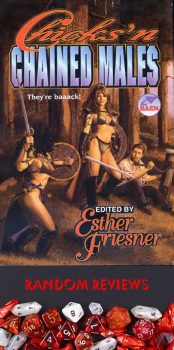Random Reviews: “Why Do You Think They Call It Middle Earth?” by Susan Casper

Because I’ve been asked about the process by which I’ve been selecting stories for the Random Review series, I thought I’d take a moment to explain how the stories are selected.
I have a database of approximately 42,000 short stories that I own sorted by story title. When it comes time for me to select a story to review as part of this series, I role several dice (mostly ten sided) to determine which story should be read. I cross reference the numbers that come up on the die with the database to see what story I’ll be reviewing. This week I rolled 40,278, which turned out to be Susan Casper’s short story “Why Do You Think They Call It Middle Earth?”
One of the things I hoped to get out of this series, from a personal point of view, was to discover authors and short stories that I’ve owned and have never read. Of course, I also hoped to share those discoveries, good or bad, with the readers of Black Gate.
Casper’s story is told from Emily Prentiss’s point of view, a thoroughly unlikable, self-absorbed woman who prides herself on her no-holds-barred attitude in the boardroom. While berating a homeless man one day, she falls through a crack in the earth and finds herself in a fantastic realm, intent on finding someone who will pay for her misfortune.
Prentiss inflicts herself on a variety of elves, dwarves, and hobbits, becoming increasingly unpleasant in her insistence that they send her home as well as informing them of the various lawsuits she intends to file against them to cover her inconvenience. Unfortunately for both Prentiss and the denizens of this Middle Earth, she is identified as a prophesied hero, who must fulfill a service before she can be returned to her home.

The stars having showed the elves that Prentiss was referred to as a dragonslayer for her prowess in the boardroom, they dispatched her to take on a dragon in their own world in order to fulfill the prophecy, which she eventually acquiesces to. Casper does an excellent job of infusing humor into the story, making the loathsome Prentiss an object of derision for the reader, never quite becoming a sympathetic character, but certainly one the reader could accept, even if it was to see her as the villain she couldn’t see herself as and the hero the elves needed her to be.
Although Casper’s title directly references Tolkien’s world, the land in which Prentiss finds herself is not his Middle Earth, although the merest suggestion allows the reader to understand the world in which she finds herself better than if Casper had been required to world build from scratch. As the title alludes to, when taken in conjunction with the manner in which Prentiss arrived in this world, it is part of our own world, although situated somehow between the crust and the core.
The story’s ending is slightly less than satisfying as it does not result in Prentiss receiving the comeuppance she so richly deserves, but at the same time, she does not manage to get the reward that she had hoped for, so she must instead learn to live with the outcome that prophecy and Casper have decided should be hers.
 Steven H Silver is a nineteen-time Hugo Award nominee and was the publisher of the Hugo-nominated fanzine Argentus as well as the editor and publisher of ISFiC Press for 8 years. He has also edited books for DAW, NESFA Press, and ZNB. His most recent anthology is Alternate Peace and his novel After Hastings was published in 2020. Steven has chaired the first Midwest Construction, Windycon three times, and the SFWA Nebula Conference 6 times. He was programming chair for Chicon 2000 and Vice Chair of Chicon 7.
Steven H Silver is a nineteen-time Hugo Award nominee and was the publisher of the Hugo-nominated fanzine Argentus as well as the editor and publisher of ISFiC Press for 8 years. He has also edited books for DAW, NESFA Press, and ZNB. His most recent anthology is Alternate Peace and his novel After Hastings was published in 2020. Steven has chaired the first Midwest Construction, Windycon three times, and the SFWA Nebula Conference 6 times. He was programming chair for Chicon 2000 and Vice Chair of Chicon 7.